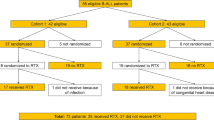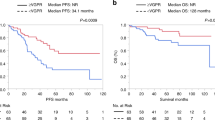Abstract
High-dose melphalan is the standard conditioning regimen for patients with AL amyloidosis receiving autologous stem cell transplantation. Conventional formulations require propylene glycol (PG) as a co-solvent and melphalan has limited solubility and chemical stability after reconstitution, with potential risks for propylene glycol-related complications. Captisol-stabilized propylene glycol-free (PG-free) melphalan has been developed with improved solubility and chemical stability. We compared a cohort of patients with AL amyloidosis receiving PG melphalan (n = 96) to those receiving PG-free melphalan (n = 48) as conditioning for autologous stem cell transplantation. Median time to neutrophil and platelet engraftment was the same; 14 days PG melphalan vs 14 days PG-free melphalan, p = 0.73 and 16 days PG melphalan vs 16 days PG-free melphalan, p = 0.52, respectively. Hospitalization rate was similar in both cohorts, 68% PG melphalan vs 58% PG-free melphalan, p = 0.27. All-cause mortality at 100 days was not statistically significant, 3% PG melphalan vs 2% PG-free melphalan, p > 0.99. Overall response rate (ORR) and rates of complete response (CR) were similar (ORR 93% PG melphalan vs 94% PG-free melphalan, p > 0.99 and CR 39% PG melphalan vs 32% PG-free melphalan, p = 0.46). PG-free melphalan showed a comparable safety and efficacy profile to PG melphalan in patients with AL amyloidosis receiving stem cell transplantation.
This is a preview of subscription content, access via your institution
Access options
Subscribe to this journal
Receive 12 print issues and online access
$259.00 per year
only $21.58 per issue
Buy this article
- Purchase on Springer Link
- Instant access to full article PDF
Prices may be subject to local taxes which are calculated during checkout

Similar content being viewed by others
References
Moreau P, Facon T, Attal M, Hulin C, Michallet M, Maloisel F, et al. Comparison of 200 mg/m(2) melphalan and 8 Gy total body irradiation plus 140 mg/m(2) melphalan as conditioning regimens for peripheral blood stem cell transplantation in patients with newly diagnosed multiple myeloma: final analysis of the Intergroupe Francophone du Myelome 9502 randomized trial. Blood. 2002;99:731–5.
Anagnostopoulos A, Aleman A, Ayers G, Donato M, Champlin R, Weber D, et al. Comparison of high-dose melphalan with a more intensive regimen of thiotepa, busulfan, and cyclophosphamide for patients with multiple myeloma. Cancer. 2004;100:2607–12.
Bayraktar UD, Bashir Q, Qazilbash M, Champlin RE, Ciurea SO. Fifty years of melphalan use in hematopoietic stem cell transplantation. Biol Blood Marrow Transplant. 2013;19:344–56.
Hari P, Aljitawi OS, Arce-Lara C, Nath R, Callander N, Bhat G, et al. A phase IIb, multicenter, open-label, safety, and efficacy study of high-dose, propylene glycol-free melphalan hydrochloride for injection (EVOMELA) for myeloablative conditioning in multiple myeloma patients undergoing autologous transplantation. Biol Blood Marrow Transplant. 2015;21:2100–5.
Wilson KC, Reardon C, Theodore AC, Farber HW. Propylene glycol toxicity: a severe iatrogenic illness in ICU patients receiving IV benzodiazepines: a case series and prospective, observational pilot study. Chest. 2005;128:1674–81.
Badar T, Hari P, Chhabra S, Dhakal B, Drobyski WR, Fenske TS, et al. Use of propylene glycol-free melphalan conditioning in light-chain amyloidosis patients undergoing autologous hematopoietic cell transplantation is well tolerated and effective. Bone Marrow Transplant. 2018;53:1210–13. https://doi.org/10.1038/s41409-018-0178-5. Epub 2018.
Sidiqi MH, Aljama MA, Buadi FK, Warsame RM, Lacy MQ, Dispenzieri A, et al. Stem cell transplantation for light chain amyloidosis: decreased early mortality over time. J Clin Oncol. 2018;36:1323–9.
Palladini G, Dispenzieri A, Gertz MA, Kumar S, Wechalekar A, Hawkins PN, et al. New criteria for response to treatment in immunoglobulin light chain amyloidosis based on free light chain measurement and cardiac biomarkers: impact on survival outcomes. J Clin Oncol. 2012;30:4541–9.
Aljitawi OS, Ganguly S, Abhyankar SH, Ferree M, Marks R, Pipkin JD, et al. Phase IIa cross-over study of propylene glycol-free melphalan (LGD-353) and alkeran in multiple myeloma autologous transplantation. Bone Marrow Transplant. 2014;49:1042–5.
Singh R, Chen J, Miller T, Bergren M, Mallik R. Solution stability of Captisol-stabilized melphalan (Evomela) versus Propylene glycol-based melphalan hydrochloride injection. Pharm Dev Technol. 2016;14:1–6. https://doi.org/10.1080/10837450.2016.1265557. [Epub ahead of print].
Koltun M, Morizzi J, Katneni K, Charman SA, Shackleford DM, McIntosh MP. Preclinical comparison of intravenous melphalan pharmacokinetics administered in formulations containing either (SBE)7 m-beta-cyclodextrin or a co-solvent system. Biopharm Drug Dispos. 2010;31:450–4.
Desmaris RP, Mercier L, Paci A. Stability of melphalan in 0.9% sodium chloride solutions prepared in polyvinyl chloride bags for intravenous injection. Drugs R D. 2015;15:253–9.
Author information
Authors and Affiliations
Corresponding author
Ethics declarations
Conflict of interest
MAG received consultancy from Millenium and honoraria from Celgene, Millenium, Onyx, Novartis, SmithKline, Prothena, Ionis, and Amgen. SKK received consultancy from Celgene, Millennium, Onyx, Janssen, and BMS and research funding from Celgene, Millennium, Novartis, Onyx AbbVie, Janssen, and BMS. MQL received research funding from Celgene. DD received research funding from Karyopharm Therapeutics, and Millenium Pharmaceuticals. PK received research funding from Takeda, Celgene, and Amgen. AD received research funding from Celgene, Millennium, Pfizer, and Janssen and travel grant from Pfizer. The remaining authors declare that they have no conflict of interest.
Rights and permissions
About this article
Cite this article
Sidiqi, M.H., Aljama, M.A., Muchtar, E. et al. Safety and efficacy of propylene glycol-free melphalan as conditioning in patients with AL amyloidosis undergoing stem cell transplantation. Bone Marrow Transplant 54, 1077–1081 (2019). https://doi.org/10.1038/s41409-018-0388-x
Received:
Revised:
Accepted:
Published:
Issue Date:
DOI: https://doi.org/10.1038/s41409-018-0388-x



